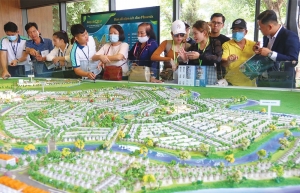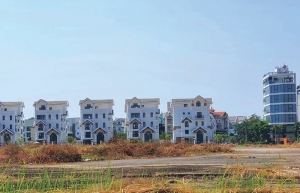Comprehensive approach will engage real estate
These funds have their characteristics, risk appetite, and investment criteria, which are necessary for Vietnamese real estate developers to understand and identify suitable partners and tailor their investment proposals appropriately.
 |
| Diane Tan, Consulting partner AsiaInvest Group |
Significant developments in the real estate sector of Vietnam have also attracted major interest from both domestic and international investors. In 2023, the Strategic Hospitality Extendable Freehold and Leasehold Real Estate Investment Trust completed deals to sell IBIS Saigon South Hotel and Capri by Frasers Hotel in Ho Chi Minh City to UK-based company LT Rubicon for about $33 million.
In another deal, Keppel Land signed formal agreements to acquire 49 per cent from Khang Dien Group in two adjacent housing projects in Thu Duc of Ho Chi Minh City worth about $136 million in the same month. Singapore-based Thomson Medical Group also bought FV Hospital in Ho Chi Minh City for $381.4 million in July, which is the largest transaction in Vietnam’s medical industry to date.
Partnerships for private equity funds provide Vietnamese real estate investors with patient capital, strategic direction, and strategic partners with investors in project development plans. These funds often invest in unlisted companies with great potential to provide financial resources and professional experience to implement large projects and expand their scale. To attract private investment funds, investors need to demonstrate good operating results, a clear development vision, and a team of qualified and experienced personnel.
Sovereign wealth funds managed by the government often seek long-term investments in consistent with national development goals. Vietnamese real estate developers can utilise this by aligning their projects towards the government’s priority goals, such as infrastructure development projects, affordable housing, and sustainable urban development projects. Demonstrating a commitment to social and environmental responsibility can help investors attract these funds.
The total committed capital of the IFC in Vietnam was nearly $1.9 billion in 2023, including $520 million of long-term finance. The IFC and others are truly interested in projects that meet affordable housing needs, and the growing middle class in Vietnam is facing a shortage of affordable housing, especially in urban areas.
They are also investing in projects that provide high-quality, affordable housing options for low- and middle-income households; as well as promote green and sustainable practices like sustainable design principles and energy-efficient technologies to reduce environmental impact and mitigate climate change risks. To date, the IFC has committed more than $900 million in long-term funding to support climate-related projects in Vietnam.
These funds are interested in projects that improve infrastructure such as transportation networks, utilities, and public spaces to support economic growth and high quality of life for Vietnamese people. Global finance institutions are also supporting mixed-use projects including housing, commerce, retail, and the creation of innovative spaces that build vibrant residential communities.
For inclusive and sustainable development, they prioritise projects that meet the needs of all communities, including marginalised groups, in combination with prevention and recovery measures post-disaster to address climate and natural disaster risks.
Real estate investment trusts provide Vietnamese real estate developers with a divestment and liquidity strategy for cash flow-generating real estate assets. These funds mobilise capital from a variety of investors and purchase cash-flow-generating properties, sharing a part of the rental income with shareholders. Vietnamese developers can leverage real estate investment trusts to unlock liquidity, diversify their portfolios, and draw in a broader audience of investors.
Hedge funds use complex investment strategies and often use leverage to raise profits. While this fund can provide much capital, the risk ratio is also higher. Vietnamese real estate developers should carefully evaluate the risks relative to their investment objectives before engaging with hedge funds.
To effectively entice global investment capital, Vietnamese real estate developers should apply a comprehensive approach that includes building a positive operating history, developing attractive investment proposals, enhancing transparency and governance, and building a network with investment fund managers.
They must also understand and comply with local regulations and market dynamics, implement strict financial management, cooperate with experienced consulting units, emphasise sustainable practices, and utilise technology to manage projects more effectively.
 | More attention likely in housing ownership The National Assembly passed a new Law on Housing and new Law on Real Estate Business last November. Anh Le, managing partner at DN Legal, analyses a number of legal changes related to housing ownership of foreigners in Vietnam. |
 | Players display positivity for real estate A range of amendments to laws on housing, real estate, and land is expected to make the market more stable. |
What the stars mean:
★ Poor ★ ★ Promising ★★★ Good ★★★★ Very good ★★★★★ Exceptional
Related Contents
Latest News
More News
- Construction firms poised for growth on public investment and capital market support (February 11, 2026 | 11:38)
- Mitsubishi acquires Thuan An 1 residential development from PDR (February 09, 2026 | 08:00)
- Frasers Property and GELEX Infrastructure propose new joint venture (February 07, 2026 | 15:00)
- Sun Group led consortium selected as investor for new urban area (February 06, 2026 | 15:20)
- Vietnam breaks into Top 10 countries and regions for LEED outside the US (February 05, 2026 | 17:56)
- Fairmont opens first Vietnam property in Hanoi (February 04, 2026 | 16:09)
- Real estate investment trusts pivotal for long-term success (February 02, 2026 | 11:09)
- Dong Nai experiences shifting expectations and new industrial cycle (January 28, 2026 | 09:00)
- An Phat 5 Industrial Park targets ESG-driven investors in Hai Phong (January 26, 2026 | 08:30)
- Decree opens incentives for green urban development (January 24, 2026 | 11:18)

 Tag:
Tag:





















 Mobile Version
Mobile Version